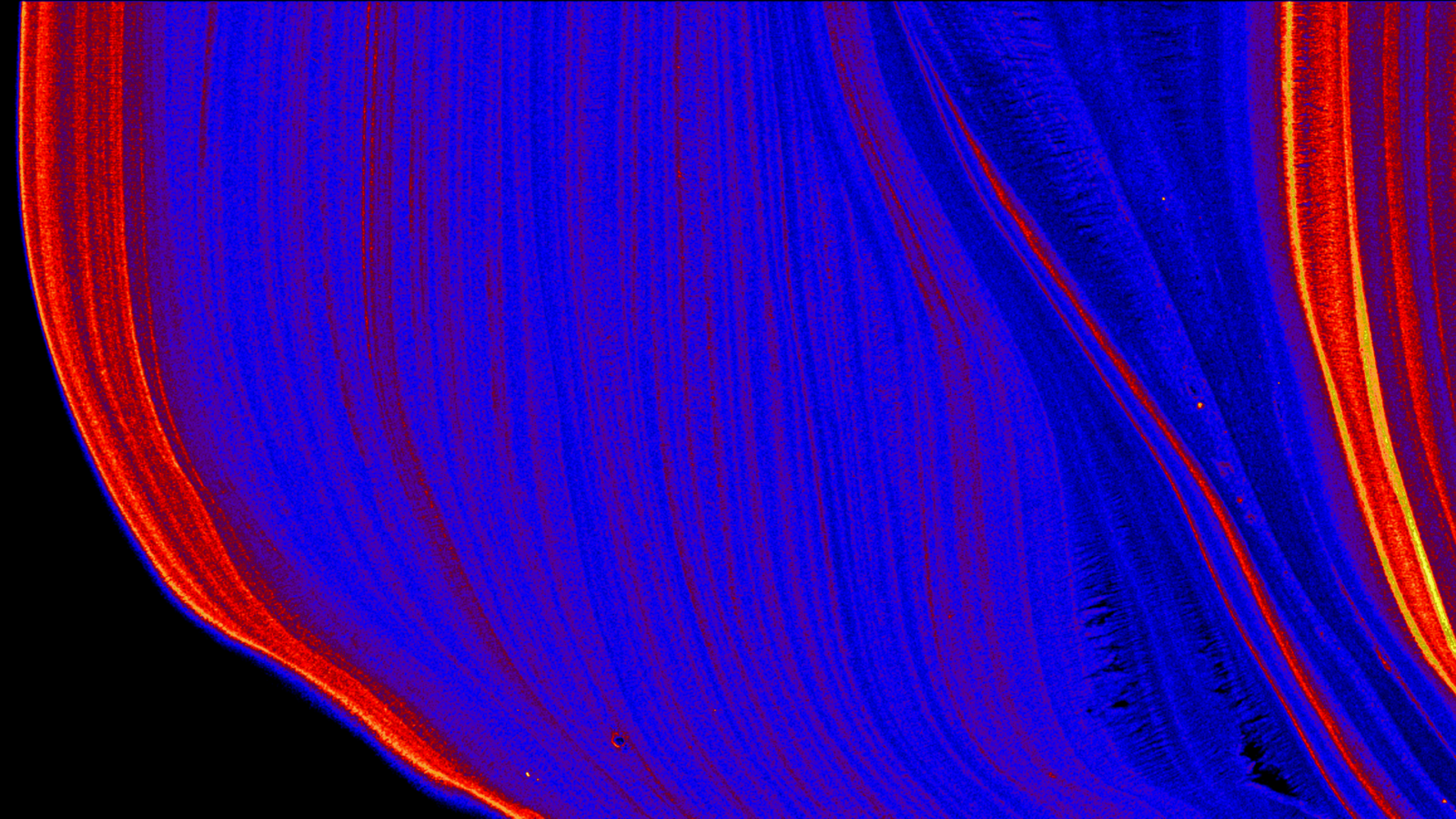Unearthing the Present
What is the new geological epoch made of? Unearthing the Present connected the geological analysis of the present with a discussion of the changing scope for social and political agency.

How does a new geological epoch take shape? What do the sediments of Earth tell us about the present and about the actions and decisions we have to take today? The planet has entered the first stage of the Anthropocene: a highly disruptive transitional period of “global weirding” within which ecological patterns and societal structures are changing radically. Between 2020–22, the Anthropocene Working Group was assembling stratigraphic evidence for the geological reality of the new Earth epoch. Unearthing the Present connected these analyses with a discussion of the changing scope for social and political agency. In collaborative Core Readings, scientists, researchers, artists and activists deciphered stratigraphic samples from pacific corals, from lake deposits in northeastern China and from speleothems found in an Italian cave. They examined the microscopic traces left in Earth’s archives by the burning of fossil fuels, atmospheric nuclear bomb testing and the disruption of marine ecosystems to jointly identify ways and means of responding to these signals.
- contributionSoren Brothers, Katrin Klingan, Francine M.G. McCarthy, Michelle Murphy, Catherine Tammaro, Mark Williams
Core Readings: Crawford Lake
How do different forms of societal organization and land use over the centuries affect the environment on local and planetary levels?
Consensus Building, Conversation, Engagement, Field Work, Life, History, Human-environment relations, Landscape, Scale, Settler Colonialism, Knowledge production
- contributionDaniel Emanuelsson, Jack Humby, Susan Schuppli, Dieter Tetzner, Liz Thomas, Mark Williams
Core Readings: Antarctic Peninsula
Researchers study an ice core from one of the fastest-warming places on Earth—revealing key data on Antarctica’s environmental history.
Engagement, Field Work, Consensus Building, Human-environment relations, History, Climate change
- contributionYongming Han, Li Li, Mark Williams, Mi You
Core Readings: Sihailongwan Lake
Tracing socio-political upheavals and technological change in sediment samples from Sihailongwan Lake in northeastern China.
Engagement, Field Work, Consensus Building, Technosphere, Water
- contributionNeal Cantin, Kristine L. DeLong, Sophia Roosth, Mark Williams, Jens Zinke
Core Readings: West Flower Garden Bank Reef and Flinders Reef
A close reading of coral samples from the Caribbean Sea and Pacific Ocean—finding signals of ocean warming and the impacts of offshore oil extraction.
Field Work, Conversation, Consensus Building, Engagement, Extraction, Climate change, Ocean
- contributionAnthony D. Barnosky, Elizabeth A. Hadly, Allison Stegner
How to Read a Changing Earth?
A live annotation of a sediment core from the Searsville Lake uncovered the anthropogenic markers inscribed into this stratigraphic material.
Archiving, Conversation, Field Work, Deep time, Stratigraphy, Data, Holocene, Sedimentation, Water
- contributionVictor Galaz, Simon Turner
Exchange On Collaboration And Complexity
How best can organizations reconcile alliance building, promote public discussions on environmental crises and nurture cultural shifts?
Conversation, Engagement, Scale, Adaptation, Governance, Participatory governance
- contributionJamie Allen, Irka Hajdas
Exchange On Deep Time And Deep Responseability
How do the geochronologists and geohistorians understand their response-ability to material signals from the past?
Conversation, Reflection, Stratigraphy, Time, Deep time, Agency
- contributionSusan Schuppli, Liz Thomas
Exchange on Melting Narrations
How can we mediate and embed scientific findings into new narrations? And what contingency, what order, will these narrations have?
Conversation, Engagement, Climate change, Deep time, Water, Ocean
- contributionAndy Cundy, Brian Holmes
Exchange on the Half Life of the Nuclear Age
What are the prospects of living among radioactive substances as military spending on atomic weapons increases and some countries invest in and maintain nuclear power on their paths to “net zero” CO₂ emissions?
Conversation, Reflection, Radioactivity, Risk, Climate change
- contributionLesley J. F. Green, Francine M.G. McCarthy
Exchange on Geo-Inheritance
What alliances and common questions can help to work toward a science of partnerships, especially in processes that include more-than-human entities?
Conversation, Engagement, Knowledge production, Education, Complexity, History
- contributionBernadette Bensaude-Vincent, Andrea Borsato, Nigel Clark, Ann Cotten, Olúfẹ́mi O. Táíwò
Clashing Presents: Reconciling Presents
A conversation that takes the stratigraphic research in Ernesto Cave, Italy, as a starting point for exploring how we might conceive a truly planetary time.
Conversation, Reflection, Stratigraphy, Time, Deep time, Water, Data
- contributionOrit Halpern, Stephen Himson, Sophia Roosth, Mark Williams, Matthew C. Wilson
Clashing Presents: Memory and Oblivion in Times of Extinction
Exploring the accelerating processes and cumulative events of species extinction by examining biotic changes in the sediments of the San Francisco Bay.
Conversation, Reflection, Extinction, Species, Deep time, Time, Biodiversity
- contributionVictor Galaz, Cymene Howe, Liz Thomas, Ricarda Winkelmann
Clashing Presents: Between Big Melt and Small Governance
Which temporal immediacies and horizons do new forms of collectives, connected through a rising global ocean, need to coalesce?
Conversation, Reflection, Consensus, Stratigraphy, Deep time, Time, Policy
- event
Core Readings
For the opening night of Unearthing the Present, scientists, researchers and artists undertake a series of close readings in the stratigraphic archives of the Anthropocene.
Conversation, Engagement, Field Work, Stratigraphy, Sedimentation, Holocene, Deep time
- event
Earth Indices
An exhibition by artists Giulia Bruno and Armin Linke explores the scientific and social conditions producing the new geological epoch, the Anthropocene.
Archiving, Intervention, Field Work, Data, Stratigraphy, Deep time, Holocene, Sedimentation
- event
Markers: Material Delineations of the Present
Eight sessions in three stages examine how a particular chemical or biological fingerprint becomes a demarcation for the new geological epoch of the Anthropocene.
Field Study, Reflection, Teaching, Conversation, Engagement
- event
What if the Dam was removed?
What could a single major infrastructural decision tell us about the situational contexts of bringing about lasting change?
Case Study, Conversation, Infrastructure, Governance, Landscape, Agency, Water
- event
Clashing Presents
Exploring the competing time horizons, latency effects and accelerations that run counter to the pulse of late-Holocene societies.
Conversation, Extinction, Deep time, Time, Holocene, System, Biosphere, Stratigraphy, Governance
